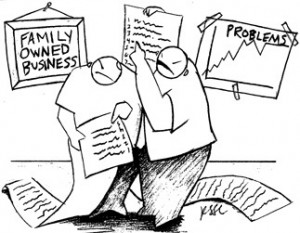
This article is from the “So You’re In The Family Business” series, authored by Paul Karofsky. To view more of these family business articles, click here.
WHEN A HOPE IS NOT A PROMISE
Sandy: When I started to work for you, Dad, you told me I would take over the business. That was thirteen years ago. How long am I going to have to wait?
Tom: I guess every father hopes to see his son follow in his footsteps, but I’m not ready to head out to pasture just yet. And I’m not so sure that you’re ready to take over.
Sandy: I’m beginning to wonder if you’ll ever think I’m ready. Maybe that’s just your way of “holding on.”
Tom reflects, “I always had the dream that Sandy would take over this company. I’m sure I told him that when he started to work here. I tried to build it for him. It’s still my hope that he’ll be able to take it over, but I’m not so sure he’s ready to handle it. I’m not even sure he ever will be. The market is changing so rapidly. Technology and regulations are ruling our lives. Competition is fierce. And our banker isn’t all that friendly any more. Sandy’s outside experience and preparation to deal with this business is limited. He certainly doesn’t put in the hours that I did. He doesn’t want to work on Saturdays. He doesn’t focus well on the details and he’s sloppy. At sixty-seven, I think I’ve had enough, but I still need income from the company to support me. Maybe I should sell to an outside party.”
Sandy thinks to himself, “He told me that this business would be mine. He made a promise, a commitment. Now he can’t let go. Maybe it’s a power or control thing. Maybe he’s afraid of growing old. I’m thirty-six years old with three kids of my own. Am I going to work for my father forever? He complains that I don’t work as hard as he does. Maybe I don’t put in his sixty hour weeks, but I don’t think I have to. I want to go to my children’s ball games and spend week-ends with my family. That’s something my father never did. I’ve been working on the floor for many years. I’ve got a handle on the big picture. I know how to run this business.”
What’s going on…
Dad is clear about his hope, his dream that some day his son would take over the family business, but contingent on Sandy’s ability to handle it. He never intended his “hope” to be interpreted as a “promise.” Tom is troubled about Sandy’s lack of attention to details. He sees Sandy’s outside experience and training as limited relative to the challenges the company is facing. He is also concerned about Sandy’s dedication to the business in terms of time, and his own dependence on the company for financial security.
Sandy, meanwhile, heard his father’s expression of “hope” as a commitment to him. It is something he has been counting on and waiting for and to which he feels entitled. Sandy sees himself as knowledgeable and capable of running the business because he has had extensive experience “on the floor,” and a vision of the “big picture.” Sandy’s commitment of time is different than his father’s. A priority for him is being able to spend time with his wife and children.
What to do…
- Tom and Sandy need to clarify their understanding of what Tom intended as a “hope” and Sandy heard to be a “promise,” and the expectations that created for each of them. Tom can explain to Sandy that leadership succession is not an entitlement.
- Together, Tom and Sandy should discuss the “big picture” and determine what makes up the essence of their business. What are the relative needs in terms of technology, government regulations, competition, and finance?
- Sandy’s knowledge, skills and experience in those vital areas need to be assessed in view of his limited outside experience and prior training. Sometimes key non-family managers, who possess greater objectivity, can lend insight and commentary to both Sandy’s skills and Tom’s perceptions.
- Father and son should discuss their differing views on “time.” What trade-offs and compromises can be negotiated so the needs of the business can be satisfied along with Sandy’s priority of spending time with his family.
- Tom needs to share with Sandy his financial concerns and fear of being dependent on a business whose leader may lack essential skills. Tom must build a plan to attain financial security.
- Sandy, with Tom’s guidance, should prepare a career development plan, listing the specific skills that need to be attained, how they will be learned, how they will be measured, and an appropriate time-frame for re-evaluation.
It is not unusual for members of the senior generation to express the hope that their children will come into the family business, and it is equally common for the younger generation to interpret that hope as a promise. While more open discussion and the achievement of Sandy’s career development plan do not guarantee that Tom will have the necessary confidence in his son to turn the business over to him, a shared commitment and collaboration to try to make it work are essential prerequisites to even a potential perpetuation of a family business.
Related Articles:
- Next Generation Challenges: Peter Buffett on Next Generation Entitlement
- Managing the Family Business: Thoughts from an Intergenerational Family Gathering
- Bringing Non-Family Executives Into The Family Business

